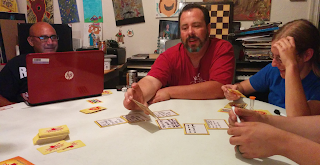One quick note before we get to the article reprint: the Andrana Project is live on Kickstarter. At this moment, there are 10 days left before the end of the drive. This looks like a great game, and they're only at 54% funded. If you read this before 5 December 2017, please head on over to their Kickstarter page and help them meet their goal!
When people sit down to play games, what exactly are they doing? I spoke of this a bit a couple of weeks ago. Depending on the nature of the game, we are doing things that can be just as difficult as a so-called 'job.' Games come in so many different forms; games of luck, of physical prowess, of strategy, of skill (broken into many different types of skill; spatial reasoning, manual dexterity, mathematical ability, and so forth), games of knowledge or memory or bluffing or deduction... It may be obvious by now that I am most strongly drawn towards games that have a serious element of telling stories.






